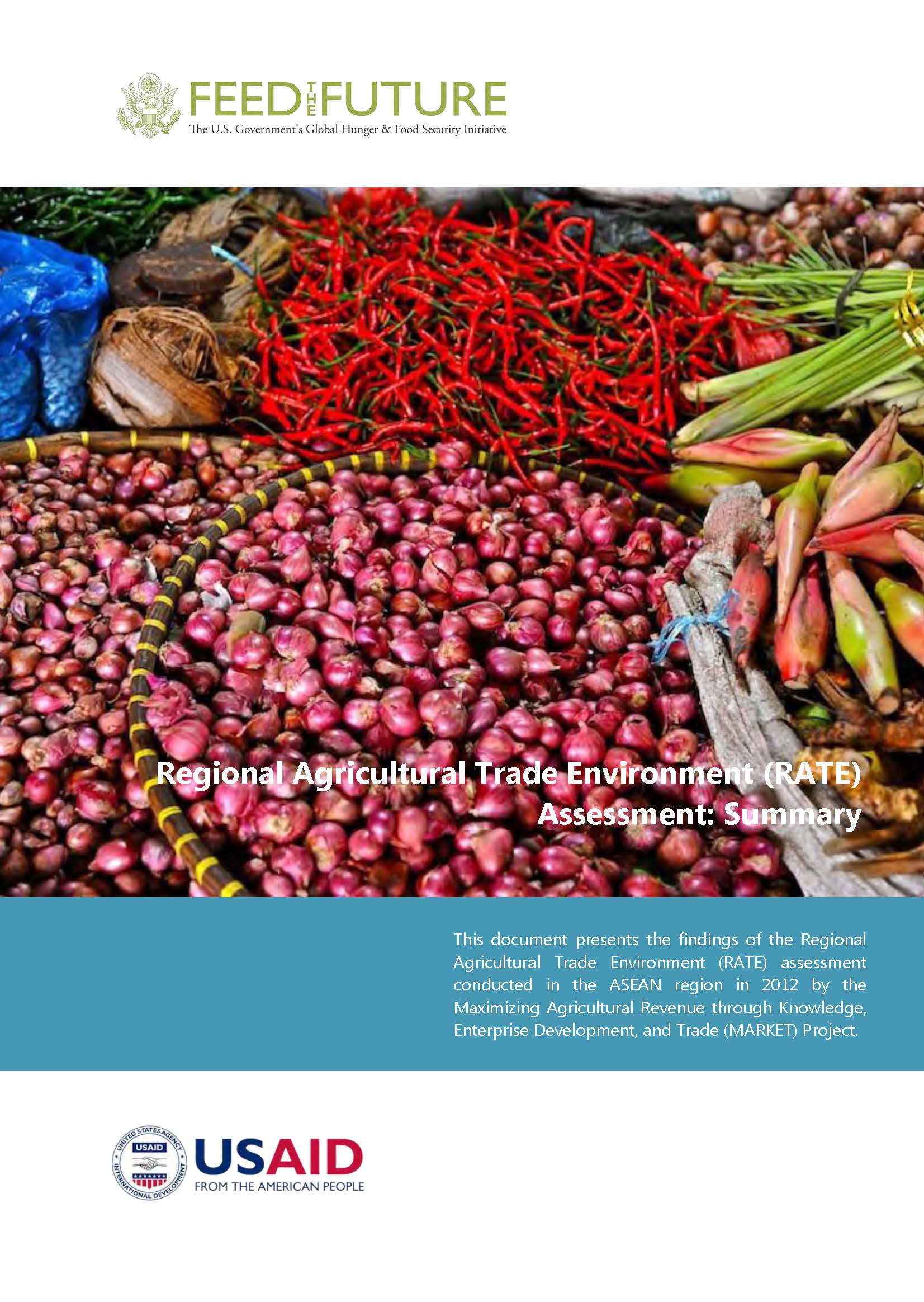![]() (632k) RATE Summary PDF
(632k) RATE Summary PDF
The Regional Agricultural Trade Environment assessment, implemented by the USAID Maximizing Agricultural Revenue through Knowledge, Enterprise Development and Trade Project, is a tool for examining the agricultural trade enabling environment of countries that are members of regional organizations, to help regions streamline and strengthen their approaches to cross-border trade and food security. The assessment reports are grounded in USAID’s commitment, through its Feed the Future Initiative, to facilitate the integration of farmers and rural industries into the full chain of production, from “farm to fork,” enabling them to better connect with agricultural trade and market opportunities. (Read the full Introduction Report here .)
Launched in April 2012, the assessment reports cover seven of the 10 member states of the Association of Southeast Asian Nations (ASEAN). It examines a range of agriculture and trade-related policies, laws, institutions, and social dynamics that impact the environment for trade, both with respect to international markets, and, critically, among ASEAN Member States themselves.
The reports:
- Analyze the trade environment for agricultural products in each country,
- Explain how that environment affects trade in agricultural commodities and food security, and
- Recommend legal and institutional reforms necessary to improve trade in agricultural products.
Seven reports focus on individual countries and 10 address specific topics. All reports promote private sector advocacy and monitoring of reform at the national and regional levels.
Country Reports
These reports summarize general findings from the Regional Agricultural Trade Environment assessment in each country.
Specific Topics
Access to Finance
Among ASEAN Member States, small producers and agricultural enterprises often lack sufficient access to the financial services they need, or available services—often informal and unregulated—come with unfavorable terms. With more access to credit, small farms and enterprises across ASEAN could expand or become more productive, and thus earn more, improve their livelihoods, and increase the supply of food in their countries.
Competition
Competition impels companies to work as efficiently as possible and offer the most attractive price and quality in response to consumer demand, rather than conspiring as cartels, for example, to fix prices or to block market entry. Government control and interference in domestic enterprise is significant in ASEAN, particularly with respect to agricultural production, processing, and trade. Throughout ASEAN Member States, subsidies, price controls, targeted import and export restrictions, state-owned enterprises and private monopolies constrain market competition.
Food Security
As defined by the Food and Agriculture Organization of the United Nations (FAO), food security exists when all people, at all times, have physical, social, and economic access to sufficient, safe, and nutritious food that meets their dietary needs and food preferences for an active and healthy life. On the basis of this definition, one can identify opportunities to improve food security at many levels—farm, household, market, agro-processing, retail, cross-border, regional, and global.
Gender
Addressing gender in the context of food security can reduce hunger, improve food security and nutrition, and reduce poverty. The FAO has found that “giving women the same access as men to agricultural resources could increase production on women's farms in developing countries by 20 to 30 percent,” thereby raising total agricultural production in developing countries by 2.5 to 4 percent.
Informal Economy
A large percentage of the agricultural small enterprise sector in ASEAN Member States operates informally and, as a result, is disadvantaged. These businesses are either not officially registered as enterprises or do not receive assistance from the public sector because they do not meet the local definition of a business.
Infrastructure
Policymakers in the ASEAN region have strengthened their commitment to long-term infrastructure planning, which strengthens the confidence of investors and businesses. A wide infrastructure gap remains between rural and urban, however. Postharvest loss by small agricultural producers is one of the most complex problems facing the agricultural sector in Southeast Asia, with as much as 30 percent of agricultural production lost across the region each year.
Intellectual Property Rights
The legal frameworks of ASEAN Member States increasingly integrate international best practice pertaining to IPR, but national law and policy continue to vary widely. Copyright and trademark piracy remains a significant obstacle to trade and growth. In addition, concerns over brand dilution and theft keep many entrepreneurs from creating trademarks. A lack of IPR capacity and public understanding constrain full realization of the benefits of IPR. An effective IPR environment requires strong support from educational institutions and civil society.
Non-Tariff Barriers
Most ASEAN Member States have legal frameworks for quality standards associated with food, plants, animals, and animal products that put domestic and international producers on equal footing. Their food standard regimes are implemented with varying results. Traders identify a number of national rules and regulations as significant non-tariff barriers in the food and agricultural sectors. In addition, stringent domestic rules tend to undercut trade in services throughout the region.
Trade Facilitation
The influence of international and regional trade has led ASEAN Member States to increasingly bring their core customs laws, regulations, and operating procedures into harmony with one another. Domestic enterprises that trade in agricultural products are particularly harmed by the persistence of corruption among many border agencies in ASEAN. Application of risk management techniques can help reduce corruption at borders. The private sector is eager to add its perspective on domestic and regional reforms to trade facilitation.
Transparency and Accountability
Despite numerous examples of transparency and accountability being strengthened in ASEAN, official corruption permeates everyday life in a number of Member States, from the “petty” to the “grand.” Anticorruption laws enacted by ASEAN Member States are out of sync with one another. Private enterprises, including processors and traders of all sizes, are increasingly aware of the transparency demands associated with doing business in regional and international markets. The supply of business and management professionals who are capable of meeting these demands has increased in recent years, although these workers are less available in rural areas.








Comment
Make a general inquiry or suggest an improvement.